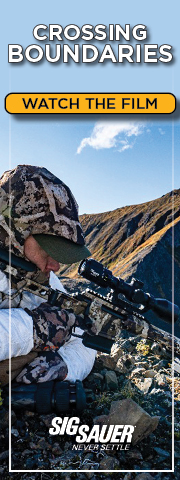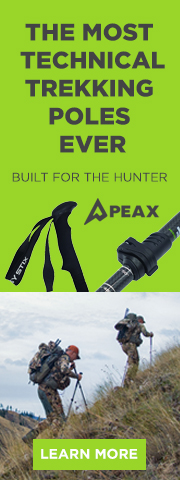Navigation
Install the app
How to install the app on iOS
Follow along with the video below to see how to install our site as a web app on your home screen.
Note: This feature may not be available in some browsers.
More options
You are using an out of date browser. It may not display this or other websites correctly.
You should upgrade or use an alternative browser.
You should upgrade or use an alternative browser.
First aid/self aid/buddy care tips, tricks, advice...
- Thread starter DTP
- Start date
Bowhunter1
Member
- Aug 16, 2017
- 369
Don't do stupid things!!
Taking risky trails with lose rocks and possibility of falls.
Jumping across streams on slippery rocks.
Getting in a hurry with a knife in your hand. The animal is down. Slow down and enjoy the moment.
Remember Most accidents can be prevented.
Taking risky trails with lose rocks and possibility of falls.
Jumping across streams on slippery rocks.
Getting in a hurry with a knife in your hand. The animal is down. Slow down and enjoy the moment.
Remember Most accidents can be prevented.
cohunter14
Administrator
- Jul 10, 2017
- 5,332
Bowhunter1 said:Don't do stupid things!!
Taking risky trails with lose rocks and possibility of falls.
Jumping across streams on slippery rocks.
Getting in a hurry with a knife in your hand. The animal is down. Slow down and enjoy the moment.
Remember Most accidents can be prevented.
Great post Terry. So true!
tylergardner
New member
- Mar 23, 2018
- 21
The best thing you can do is mitigate risk, this involves knowing ones limits, as well as the limits of those hunting with you.
The second thing is to become educated, know basic understanding of life saving skills such as; CPR, tourniquet application and placement, wound care, splinting. These skills can make all the difference when seconds count.
Third would be to invest in good gear/tech. If youre going to be in the bush deep or miles into the backcountry. Invest in a InREACH of some capacity.
The second thing is to become educated, know basic understanding of life saving skills such as; CPR, tourniquet application and placement, wound care, splinting. These skills can make all the difference when seconds count.
Third would be to invest in good gear/tech. If youre going to be in the bush deep or miles into the backcountry. Invest in a InREACH of some capacity.
82ndreddevil
New member
- Aug 17, 2017
- 58
I like to have trekking poles handy. I don?t use them while I ting necessarily but when moving in the dark I feel safer having those additional points of contact on the ground. Plus studies show that it reduces impact on your joints by 15%. Doesn?t sound like much but 15% for 5 days will benefit you by that 6th day.
Also having a satellite communicator in case of emergency or to keep DTP updated on my hunt LOL.
I like to use the ORS (Oral Rehydration Salts) that they used to issue us. It?s easy to neglect yourself while chasing game, we hardly keep ourselves properly hydrated. So at midday I drink a bottle of water with the solution and I feel I get good results from it.
Also having a satellite communicator in case of emergency or to keep DTP updated on my hunt LOL.
I like to use the ORS (Oral Rehydration Salts) that they used to issue us. It?s easy to neglect yourself while chasing game, we hardly keep ourselves properly hydrated. So at midday I drink a bottle of water with the solution and I feel I get good results from it.
Jakedjones92
New member
- Sep 2, 2018
- 2
As a paramedic that has responded to multiple Hunter/hunting related injuries I can attest to a few basic skills and tools that will ultimately get you home. You can purchase all of these items for less that 50$ online and I would say that?s on the high side of the price range. CPR/FIRST AID is always a beneficial education to have for the lay person without medical training but realize if your out in the back/high country. CPR isn?t going to get someone home unless your at the truck and relatively close to immediate prehospital care. First and foremost I would say to hunt with a buddy whenever possible ?safety in numbers? each of you should carry an aid bag outside of the general Walmart first aid kits which in my opinion are worth having. Each person should have an aide bag, something that stays with you all the time, and dont be far from it. If you?re partner needs help, use his. Don?t use yours on him. A saying we carry at the fire department is ME, US, and THEM. Take care of me, so I can take care of us, so we can take care of them. Educate yourself on the use of a tourniquet, those truly are life savers and popular belief will tell you tourniquets=loosing a limb, not true, properly applied they can save the limb it?s applied to. Carry some bulkier bandages, I.e. 4x4?s or a trauma bandage and some good self adhering wraps. If a wound is bleeding, apply the dressing, wrap tightly but not too tightly, blood loss will kill you faster than you can believe. Once you wrap it do not unwrap it until you?ve reached medical care. By unwrapping a bandaged wound you risk pulling away whatever blood clotting has occurred and allowing the wound to bleed again. If you have a heavy bleeding wound apply the tourniquet, they are extremely painful, if it doesn?t hurt it not on tight enough. Twist it until you notice a substantial decrease in blood flow, if possible find a pulse in the limb below the wound, once you find that you can either barely feel it, or have lost the pulse completely, your tight enough, it?s safe to back off the pressure enough until you can feel a faint pulse, that allows for the blood to clot in the wound but still allow blood flow to the limb preserving tissue. Carry a triangular bandage to make a sling for arm/shoulder injuries, they can be self applied and can put you ?back in the fight? quicker. A splint with a 4inch ace wrap or two for splinting arms and legs are helpful. You can buy a commercial rolled splint name brand SAM SPLINT. They are cheap and easy to use, you can find videos online on how to use them properly and often come with instructions for splinting various injuries sites. Always protect yourself from the elements whenever possible. All things I have mentioned are done easier with a hunting partner, but can all still be self applied. Apologies for such a long response but if my knowledge helps prepare someone for the unimaginable then it?s worth your reading. I?ll provide a list of tools, all of which are extremely lightweight, and can be packaged into a pouch roughly the size of 2 boxes of ammunition.
1x trauma/emt shears- they can cut any piece of clothing or ropage you might carry
1x pack of 4x4 gauze
2x 4 inch ace wraps,
1x universal splint or use your mind and utilize items you already carry to improvise a splint
1x roll of quality tape, don?t worry with medical tape, duct tape works well wet or dry
1x tourniquet- try and find one that is easily self applied, C.A.T. Tourniquets are a fine option!
?Optional? 1x trauma dressing, packaged into a flat pack about 6x12 inches, provides a large bandage for late wounds can also be used as padding for a splint or for use as a soft splint. Hope this helps!!!
1x trauma/emt shears- they can cut any piece of clothing or ropage you might carry
1x pack of 4x4 gauze
2x 4 inch ace wraps,
1x universal splint or use your mind and utilize items you already carry to improvise a splint
1x roll of quality tape, don?t worry with medical tape, duct tape works well wet or dry
1x tourniquet- try and find one that is easily self applied, C.A.T. Tourniquets are a fine option!
?Optional? 1x trauma dressing, packaged into a flat pack about 6x12 inches, provides a large bandage for late wounds can also be used as padding for a splint or for use as a soft splint. Hope this helps!!!
cohunter14
Administrator
- Jul 10, 2017
- 5,332
Great info Jakedjones92, thanks for sharing! And welcome to the forum :welcome:
Bowhunter65
Member
- Sep 5, 2016
- 101
great post jakedjones92, very well put.



